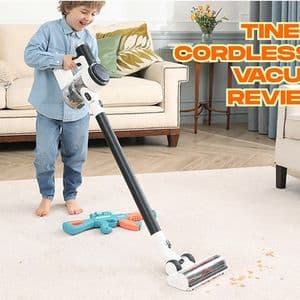Why People Seek Alternatives to Dyson Vacuums
Dyson vacuums are known for strong suction, advanced filtration, and modern design. However, they often come with a high upfront cost. If you live in a small apartment or have moderate cleaning needs, the investment might not align with your budget.
Here’s the thing:
Not everyone needs advanced laser sensors or high-capacity batteries. Many households look for reliable cleaning tools that cover essential tasks without features they won’t use.
What Makes a Vacuum a Good Alternative?
If you are looking for a cheaper alternative to Dyson vacuum, consider these factors:
Suction Power and Performance
Dyson vacuums often excel in suction and multi-surface performance. However, many other brands offer comparable suction for everyday dust and pet hair removal.
Look for vacuums with adjustable suction and multiple attachments, especially if your home has mixed flooring.
Filtration System
HEPA filtration is a critical feature for allergy control. Many affordable vacuums include HEPA filters or washable filters that help trap fine dust.
Weight and Maneuverability
Cordless vacuums are popular for their ease of movement. Check the weight, handle design, and swivel functionality for navigating around furniture.
Battery Life or Cord Length
Cordless vacuums often have shorter run times than Dyson, but some provide enough time for quick clean-ups. If you prefer corded models, look for a cord length that covers multiple rooms without constant unplugging.
Dustbin Capacity and Maintenance
A smaller dustbin requires more frequent emptying, but many budget vacuums have easy-release systems. Consider ease of filter washing, bin emptying, and part availability.
Popular Types of Cheaper Alternatives
Let’s dive into some types of vacuums you might explore as alternatives:
Stick Vacuums
Lightweight and convenient, stick vacuums are ideal for daily cleaning. Many offer a cordless design with decent run times and can convert into handheld units for furniture or car cleaning.
Upright Vacuums
These models often provide stronger suction and larger dustbins, making them suitable for homes with carpets. Some models may be bulkier but excel in deep-cleaning large areas.
Canister Vacuums
Canister vacuums can deliver powerful suction with flexibility for stairs and hard-to-reach corners. They usually have a separate canister unit connected to the vacuum head with a hose.
Robot Vacuums
Robot vacuums can complement your cleaning routine, taking care of daily dust on hard floors. While not a direct replacement for deep cleaning, they help reduce the frequency of manual vacuuming.
Budget Considerations: How Much Can You Save?
When looking for a cheaper alternative to Dyson vacuum, expect to save between 30%–70% compared to Dyson’s price depending on the model and brand you choose.
For example, if a Dyson cordless vacuum costs around $500–$700, many alternatives range from $150–$350 while covering most of your cleaning needs. The savings can be redirected to other essential home improvements or maintenance costs.
Reliability and Longevity: What to Expect
While Dyson vacuums often last several years with consistent performance, many budget-friendly vacuums can last well if properly maintained. Regularly cleaning filters, avoiding overfilling the dustbin, and checking brush rollers can extend your vacuum’s lifespan.
Using Reviews to Guide Your Research
Before purchasing an alternative, check user experiences for consistency in performance, suction, and reliability. For instance, while reading a review shark cordless vacuum, you may notice discussions around weight, battery life, or handling pet hair that help set realistic expectations about mid-range vacuum capabilities.
Reviews offer practical insights, but focus on consistent patterns across different users rather than isolated comments.
When a Dyson Vacuum May Still Be Worth Considering
While exploring cheaper options is practical, some situations might justify a Dyson:
-
You have severe allergies requiring advanced HEPA systems.
-
You need premium battery life for cleaning a large home.
-
You require advanced technology features like laser detection for fine dust.
If these do not apply to you, a less expensive vacuum can often fulfill your core cleaning needs effectively.
Additional Cleaning Tools: Do You Need Them?
When considering vacuum alternatives, think about your cleaning ecosystem:
-
Do you need a handheld vacuum for car interiors?
-
Would a small robot vacuum assist with daily dust management?
-
Should you consider a mop vacuum combo for hard floors?
These questions help align your purchase with your cleaning habits without overspending on a single device.
Read more: https://toolhome.org/lightweight-cordless-hoover/
Finding Balance Between Price and Performance
Here’s a simple mindset:
-
If you vacuum frequently and prefer quick, lightweight cleaning, a cordless stick vacuum might suit you.
-
If you need deep cleaning for carpets, a corded upright may be more efficient.
-
If you value automation, a robot vacuum can reduce your workload while a manual vacuum handles deep cleans occasionally.
Finding a cheaper alternative to Dyson vacuum does not mean compromising on cleanliness. It means understanding your needs and aligning them with the features you actually use.
Sweeper vs. Vacuum: What Should You Choose?
Some people looking for cheaper cleaning solutions may wonder: what is the best sweeper for quick clean-ups? Sweepers are ideal for surface debris on hard floors but lack the suction power of a vacuum.
If your home has low traffic and mainly hard floors, a sweeper may help reduce vacuuming frequency. However, for dust and fine particles, a vacuum remains more effective.
Final Thoughts
Exploring a cheaper alternative to Dyson vacuum can lead you to practical, budget-friendly options that align with your lifestyle. Focus on essential features like suction power, filtration, and maneuverability while considering how often and where you clean.
In many cases, a well-chosen alternative can deliver satisfying results without stretching your budget, ensuring a clean, comfortable living environment.










